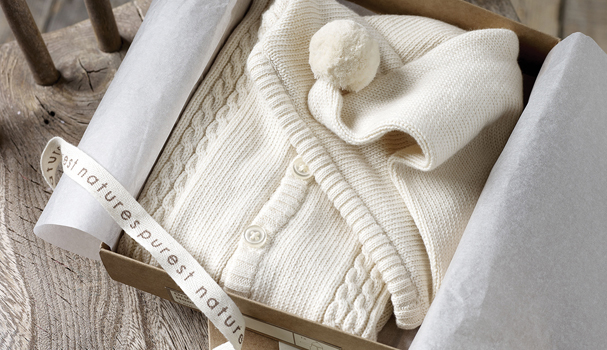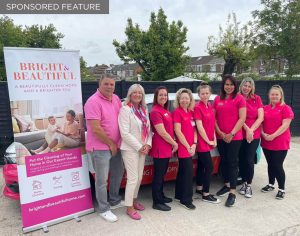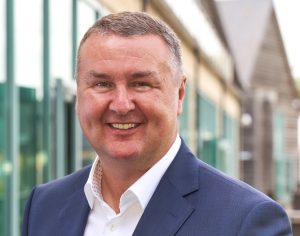In the last few decades, we have been paying increasing attention to the things we put on our skin. Use of sensitive and organic lotions and potions has increased significantly in recent times and products for infants are often marketed on their skin-friendly acumen. However, the chemicals used in the production of textiles are often overlooked, despite the fact they spend far more time in contact with a baby’s skin. This is something that Natures Purest, the chemical-free baby textiles franchise, is in the process of addressing.
Jane Albon, the company’s MD and founder, is certainly no stranger to textile design. Whilst studying to become a fashion designer, she won the M&S student designer of the year award in her third year. “That was how it all started really,” she says. By the age of 22, she’d netted a role as senior designer at M&S and thus began a long career supplying the high street, from BHS to Woolworths. She continues: “I’ve worked with most of the high street at some stage or another.”
However, after having a child of her own, she noticed a real gap in the market for high-quality baby products. Whilst new players like Next and Habitat were introducing some much needed style into the market, lines for infants still required a breath of fresh air. “When you went shopping for baby products, nothing had happened in that market,” Albon comments.
Founding her own company, she spent ten years supplying retailers like Mothercare and Zara with baby-wear, as well as making inroads into the nursery market, both here in the UK and also further afield in the US and Australia.
But it was whilst visiting China, where all of her lines were made, that Albon discovered something that utterly changed her approach to infants’ textiles: naturally coloured cotton.
Whilst the vast majority of garments are made from white cotton and then coloured with dyes, the organic pigments of the naturally coloured cotton could produce coloured textiles that wouldn’t subject your skin to an array of harsh chemicals.
“It was marketed for adult health, mainly for men,” Albon explains. “If you had terrible spots on your back or you were having breathing difficulties, you had to wear this t-shirt for six weeks then all your problems were solved. I thought: ‘if it makes that big a difference for a man, what would it do for a newborn baby?'”
When she began to look into it, it quickly became apparent she had something. “Everyone knew that in babies asthma and eczema were on the increase but there was no real explanation of it,” Albon says. However, given the average baby bedding used textiles that had around 500 different chemicals in it, it seemed a bit of a no-brainer that offering a chemical-free version would be kinder on a baby’s skin. She continues: “If you think about it, going from perfect womb to spending 16 hours a day wrapped up in bedding containing that many chemicals, it’s pretty logical really.”
Getting her hands on some samples of the fabric, Albon began to redesign everything that comes into regular contact with a baby’s skin, including bedding sets, vests and baby-grows. And this was trickier than it sounds.
But Albon’s confidence in the skin-sensitive textile was so strong that she stuck to her guns and chose a different route to market. “I was just so convinced it was right I decided to create my own brand, rather than do it as own label in a high street store,” she says. Choosing the moniker Natures Purest, she packed up the ten lines she’d created and took them to a trade fair for baby goods, where her faith was quickly rewarded. She recalls: “Within an hour, I’d got my first customer.”
It wasn’t just on the supply side that expansion was so smooth. “At one of the shows, one of my Chinese partners had a photograph taken on the stand, very proud of the new brand,” Albon comments. The partner happened to send the photograph to an acquaintance in America to show she was well and happy. “He said ‘never mind about you: what’s in the brown box?'” Albon explains. “That’s how America started.”
Australia quickly followed suit and with two other English-speaking countries on board, things were already looking bright for Natures Purest. But then something happened that really changed the public perception of what was being put in children’s products, vindicating the commitment Albon had made to bringing unadulterated baby products to market. “Lead was found in the paint for toys,” Albon says. “There was a huge crisis of ‘what is going into our toys?'”
Whilst Natures Purest only had a few toys in its line at this stage, it was perfectly positioned to provide an alternative, trustworthy product for parents who’d had their confidence in mass-produced toys shaken. “When a baby chews or sleeps next to a toy, you want to know your baby’s going to be safe,” Albon says.
That’s not to say that the company takes the ethics of its manufacturing for granted. In recent years, the brand has moved production to its own dedicated factory in Sri Lanka, where Albon felt she could ensure the highest standards were being maintained. “The government has a standard, Garments Without Guilt, where the factory’s been inspected and everything is as it should be.” Additionally, key areas of the Natures Purest line adhere to Okeo-Tex 100 certification, with the standard now being rolled out to the wider catalogue.
This has all proven very successful with retailers, with everyone from Harrods and Fortnum & Mason to Selfridges and garden centres getting in on the action. But with some buyers, their loyalty to the brand was such that they wanted an even closer relationship. Albon explains: “Quite a lot of the individual shops were saying to me ‘can I change my shop into a Natures Purest shop and just sell your things?'”
And this has been a vital part of maintaining the trust consumers have in the brand. “You’re going to meet a woman who’s probably more than 26 weeks pregnant when they enter into this category,” Albon says. “Especially for first-time parents, they’re going to need help and they’re going to need confidence that what they’re buying is safe.” This has meant Natures Purest needs to ensure its franchisees buy into the values of the franchise as much as its figures. She continues: “They’ve got to have an understanding and the passion to want to look after that baby.”
Franchising is definitely an integral part of Natures Purest’s future. “We want to achieve our full potential in franchising,” Albon comments.
However, it is still committed to enriching its offering across the board, opening a company-owned outlet for every five franchises launched, as well as offering new lines of products, including bamboo lounge-ware and cosmetics for pregnant women, to bring its natural touch to parents as well as babies. “Expansion is using what you’ve got in your ranges and making it better,” she concludes. “Never standing still.””![]()

































